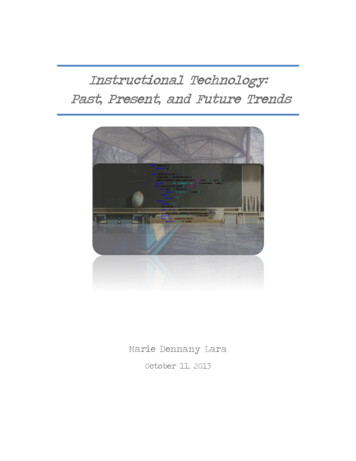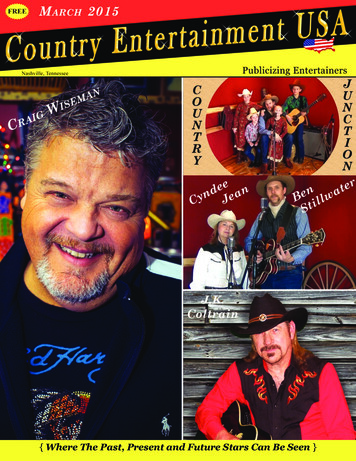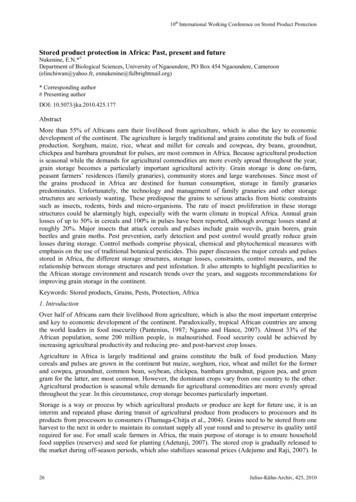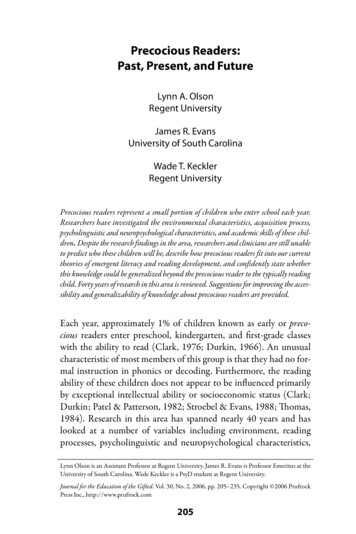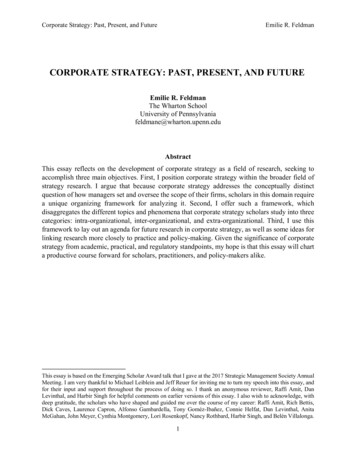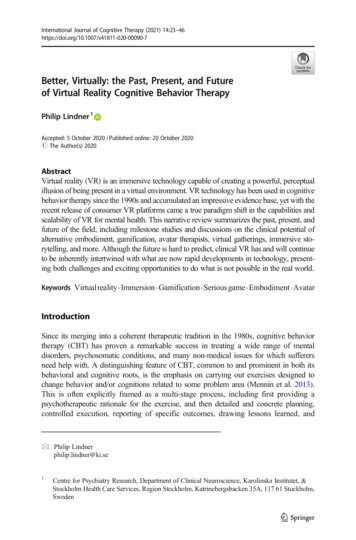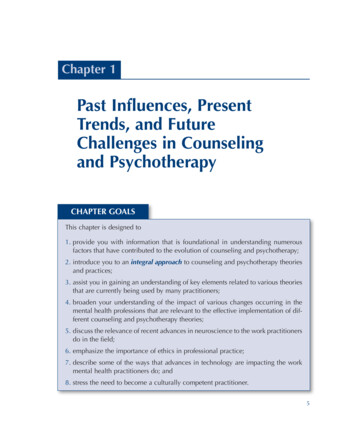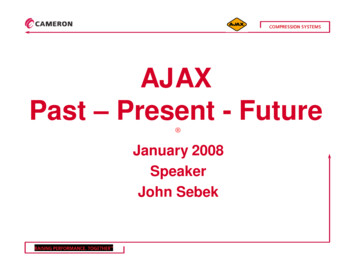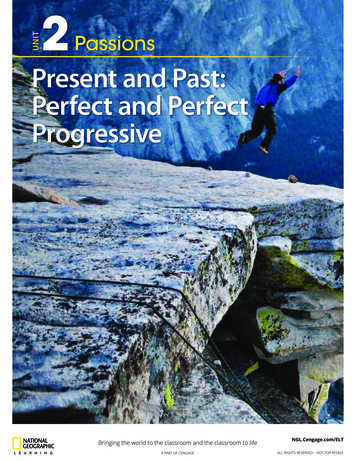
Transcription
UNIT2 PassionsPresent and Past:Perfect and PerfectProgressive51113 GE3 U02 030-061 rev09.indd 3010/31/14 5:55 PM
Climbers BASE jump from Half Dome atYosemite National Park, California.Lesson 1Lesson 2Lesson 3Review the Grammarpage 32page 41page 48page 58Present PerfectPresent PerfectProgressiveand PresentPerfectPast Perfect andPast PerfectProgressiveConnect theGrammar to Writingpage 6031
LESSON 1Present PerfectEXPLORECD1-091 READ the book review of Polar Obsession. What is Paul Nicklen’s passion?Paul Nicklen’sPolar ObsessionForor most people, the Arctic and Antarctica are strange places that we know very littleabout. Paul Nicklen’s collection of photographs and stories, Polar Obsession, offers an excellentintroduction.Nicklen grew up on an island in Northern Canada, where he learned all about the outdoorsfrom his Inuit1 neighbors. Ever since that time, he has loved animals, cold weather, andadventure.As a photojournalist, Nicklen has spent a lot of time in icy polar waters. He has followedsea lions, dived with whales, and studied polar bears. One of the most exciting parts of thebook covers Nicklen’s unforgettable encounter with a leopard seal in Antarctica.As the photographs clearly show, leopard seals are very large—up to 12 feet (4 meters) longand weighing over 1000 pounds (450 kilograms). They have huge, sharp teeth, and they movequickly through the water searching for food such as fish and penguins.Leopard seals can be dangerous, but this didn’t stop Nicklen from trying to photographone. When a huge seal approached his boat, Nicklen got into the water. He was shaking withfear, but much to his surprise the seal treated him gently. She even tried to feed him! The sealbrought him penguins to eat, and he photographed her. Nicklen says it was the most incredibleexperience that he has ever had as a photographer.In Polar Obsession, Nicklen shows us the beauty of the polar world and his passion for it.He also helps us to understand the importance of protecting it.1Inuit: indigenous people living in Arctic regions of Alaska, Canada, and GreenlandPaul Nicklen meetsa leopard seal.32Present and Past: Perfect and Perfect Progressive
The leopard seal shows its sharp teeth.2 CHECK. Write the letter of the phrase that completes each sentence.d .1. Nicklen’s neighbors taught him all about2. Nicklen has spent a lot of time working ina. leopard seals can be dangerous.b. a leopard seal3. Nicklen’s most incredible experience was with4. He was frightened because.5. The leopard seal offered Nicklenc. its foodd. the outdoors.e. icy polar waters3 DISCOVER. Complete the exercises to learn about the grammar in this lesson.A Find these sentences in the book review from exercise 1. Write the missing words.grew up1. Nicklenon an island in Northern Canada, where heall about the outdoors from his Inuit neighbors.2. Ever since that time, heanimals, cold weather, and adventure.3. As a photojournalist, Nicklen4. Hepolar bears.learneda lot of time in icy polar waters.sea lions,with whales, and5. When a huge sealhis boat, Nickleninto the water.B Look at the sentences in exercise A. Write the number of each sentence next to the phrasethat best describes the time of the event.1. Completed at a known time in the past:1 ,2. Completed at an unknown time in the past:,3. Started in the past and continues to the present:Unit 2 Lesson 133
LEARNPresent Perfect2.1statementsSubject Have/Has ( Not ) Past ParticipleAffirmativeI have visited many countries.NegativeTom hasn’t seen the photos of my trip.Questionsanswers( Wh-) Have/Has Subject Past ParticipleYes/NoHave you visited the Arctic?Has Paul taken many photos?No, I haven’t.Yes, he has.Wh-What have you heard?Who has he met?Nothing. Why?An explorer.Who/What Has Past ParticipleWho or Whatas SubjectWho has completed the assignment?What has happened?1. Use the present perfect fora. actions or events that started in thepast and continue in the present;a.Only one student (has).Nothing, yet.lived in CanadanowWe have lived in Canada for a long time.b. an action or event that happened atan indefinite time in the past;b.travel to AntarcticanowHe has traveled to Antarctica.c. recently completed actions or events;just is common with this use of thepresent perfect.tornado hitnowA tornado has just hit downtown.2. Use the present perfect to connect thepast to the present.She has taught school for 20 years. Now she wants towrite a book.3. Already, always, ever, and never oftencome before the past participle.The employees have already left work. It’s late.Have you ever seen a kangaroo?Yet and so far are common at the end ofa sentence.34c.She hasn’t called yet. I expect the call soon.The speeches have been good so far. There’s one more.Present and Past: Perfect and Perfect Progressive
4 Complete the conversations with the words in parentheses. Use the present perfect.Conversation 1Bev:How is your class going?Ken:Great. (1)Bev:That sounds interesting. (2)I’ve learned(I / learn) a lot about the Arctic and polar explorers.(you / see)that book by Paul Nicklen?Ken:No, (3). Who is he? (4)(I / never / hear) of him.Bev:He’s a photographer. (5)(he / live) and (6)(work) in polar climates for many years. (7)amazing photos of all kinds of animals.(he / take)reaL engLisHDo not repeat have/has between presentperfect verbs connected by and.He has followed sea lions and studiedpolar bears.Conversation 2Lee:(Mr. Chin / just / cancel)(8)today’s class.Jen:Really? (9)Lee:No, not yet. But I heard the class might be on Saturday.Jen:Is that possible? (10)(he / reschedule) it yet?(you / ever / have)a class on a Saturday?5 ANALYZE THE GRAMMAR. Work with a partner. Look at each answer you wrote in exercise 4.Then write the number of each answer next to the correct description below. Refer to chart 2.1.1. Started in the past and continues to the present:2. Happened at an indefinite time in the past:3. Happened recently:2.21 ,,,,,,,Present Perfect with For and SinceUse for or since with actions or events thatstarted in the past and continue to the present.graduatedMayworked at storenow/Decembera. Use for an amount of time(number of days, months, . . .).a. Jo has worked at this store for six months.b. Use since a specific past time(exact date, time, month, . . .).b. He hasn’t been a student since May.c. Use a past time clause with since.c. I’ve known him since he graduated.Unit 2 Lesson 135
6 Complete the sentences. Use the present perfect form of the verb in parentheses. Then writesince or for.1. People in many countries enjoy ice swimming. It became popular several decades ago.Peoplehave enjoyed(enjoy) ice swimmingforseveral decades.2. The first Canadian Polar Bear Swim was in 1920. It is still an annual event.The Canadian Polar Bear Swim(be) an annual event1920.3. Our town had its first New Year’s Day swim in 2010. Our town still has this swim.Our town(have) a New Year’s Day swimmany years.4. I wanted to swim with the Polar Bears when I was 13. I’m 23 and I still want to do it.I(want) to swim with the Polar Bearsten years.5. The only sport my brother does is winter swimming. Heany other sport(not play)he was a teenager.6. My father doesn’t participate anymore. His last winter swim was four years ago.My father(not participate)four years.7. My cousin always jumps into the water first. He did this last year and the year before.My cousin(always / jump) into the water firsthe joined the Polar Bears.8. We all love winter swimming. We loved our first experience, and we still love it.We2.3(love) winter swimmingPresent Perfect and Simple Past1. The present perfect is used fora. actions or events that started in the pastand continue to the present;b. completed actions or events with aconnection to the present.a. Mary is our math teacher. She has taughthere for five years.b. The children have read the rules. They’reready to play the game now.2. The simple past is used for completed actionsor events.She taught math ten years ago. Now she worksin finance.3. With the present perfect, the exact time of theaction or event is not given. They have gone to Morocco. They have gone to Morocco last month.With the simple past, the exact time of the pastaction or event is given or understood.4. Use the present perfect with a time period thathas not ended yet.Use the simple past with a completed pasttime period.36we first tried it.Present and Past: Perfect and Perfect Progressive They went to Morocco last month. did you sleep well?I’ve called her twice this morning.(It’s still morning. I may call her again.)I called her twice yesterday.
7 Circle the correct form of the verb to complete each sentence.1. a. She has dreamed / dreamed about going to the North Pole since she was young.b. She has dreamed / dreamed about going to the North Pole last night.2. a. I have never photographed / never photographed animals in the wild before.b. We have not photographed / didn’t photograph animals when we were in Alaska.3. a. Last year, my grandfather has gone / went to Iceland on business twice.b. My grandfather has gone / went to Iceland on business twice since 2005.4. a. They haven’t seen / didn’t see any bears on their trip so far.b. They haven’t seen / didn’t see any bears on their trip last month.PR ACTICE8 PRONUNCIATION. Read the chart and listen to the examples. Then complete the exercises.PronUnciationReduced Have and Has in the Present PerfectHave and has are often contracted or reduced in the present perfect. Repeat theseexamples.CD1-10CD1-11Examples:Full PronunciationReduced PronunciationLisa has just arrived.Lis z just arrived.Most people have already left.Most peopl v already left.Who has she talked to?Whoz she talked to?What have you done?What v you done?A Listen to the sentences. Which form of have/has do you hear, the full form or the reducedform? Check ( ) the correct box.Full1. Lee has always loved animals.Reduced 2. Our neighbors have adopted many animals over the years.3. Who has taken care of an animal before?4. We have faced many challenges with our cats.5. Kara has taken her dog to the park every day for years.6. Tyrone has volunteered at the animal shelter since 2012.7. Our landlords have made a rule about owning pets.8. What have you learned from working with animals?CD1-11B Work with a partner. Compare your answers from exercise A. Then listen again and checkyour answers.Unit 2 Lesson 137
Eye of a green tree python snake, common to Australia9 Complete the exercises.A Complete the interview with the words in parentheses. Use the present perfect or simple past.Sara:How long (1)Tim:(2)Sara:When (3)Tim:When (4)have you been(you / be) a snake catcher, Tim?(I / have) this job for over ten years.(you / become) interested in snakes?(I / be) a kid, and(5)(snakes / fascinate) me eversince then. When (6)(7)(I / be) in middle school,(I / not read) much about any other subject. Duringmy high school years, (8)(I / often / volunteer)at the local zoo, and then in college (9)(I / major) inherpetology—the study of reptiles.Sara:And after college (10)(you / spend) a few years inThailand. Isn’t that right?Tim:Yes, I was working with Thai snake experts. (11)(I / really enjoy) my time with them.Sara:(12)(you / ever / experience) anylife-threatening situations since you started working with snakes?Tim:(13)years, but (14)Since that time, (15)(I / work) with many poisonous snakes over the(only one / bite) me. That was scary!(I / pay more attention)to the snakes’ behavior.38Sara:Why do you love your job?Tim:(16) BecausePresent and Past: Perfect and Perfect Progressive(I / be) able to live my childhood dream.
CD1-12B Listen and check your answers. Then practice the conversation with a partner. Noticeyour pronunciation.10 EDIT. Read the e-mail. Find and correct eight more errors with the present perfect andsimple past.Dear Ms. Ramos,sawI am writing to apply for the position of staff photographer that I have seen on yourwebsite. I believe that my experience has prepared me well for this job.Photography is my passion. I loved photography ever since I was a child. That is whenI have gotten my first camera. The thrill of taking pictures never gone away, but myinterests have changed over the years. While I was growing up, I liked to photographpeople; however, as an adult, I have took more pictures of nature than people.I lived in Hawaii since 2013, and I have traveled all over the islands to photographrare birds and plants. I’ve learned a lot, and my technique has improved in the last fewyears. My photos has never appeared in a magazine or book, but several have been ondisplay at a local gallery since several months. I would be happy to share my portfolio onrequest.I have heared a lot about your magazine, and it would be a pleasure to work for you.I look forward to talking to you about this opportunity.Sincerely,Katy MillsUnit 2 Lesson 139
11WRITE & SPEAK.A Use the words to write questions. Use the present perfect or simple past.1. what activities / you / always / love / to doWhat activities have you always loved to do?2. what activities / you / enjoy / when you were younger3. you / visit / any interesting places / when you were a child4. you / visit any interesting places / recently5. what dreams for the future / you / have / as a child6. what / goals / you / achieved / in the last few yearsB Work with a partner. Ask and answer the questions in exercise A.A: What activities have you always loved to do?B: I’ve always loved listening to music.12 APPLY.A What is your passion? What kind of job would allow you to follow your passion? Imagine thatyou are applying for your ideal job. Write an e-mail and apply for that job. Use ideas from thee-mail in exercise 10 on page 39 to help you. Use the simple past and present perfect.B Read a partner’s e-mail. Ask and answer questions about each other’s passion.A: So, you’ve been playing the flute ever since you were a child. I didn’t know that.B: Yeah. I’ve always loved it.A: Have you always wanted to play in an orchestra?B: No. At first, I wanted to be a music teacher.40Present and Past: Perfect and Perfect Progressive
Present Perfect Progressive and Present PerfectLESSON 2EXPLORECD1-131 READ the magazine article about Helen Thayer. What advice does she have forother people?Helen Thayer: A Lifelong AdventurerHelen Thayer has never let age stop her. She andher husband, Bill, fulfilled a lifelong dream for their40th wedding anniversary. They walked 1600 miles(2575 kilometers) in intense heat across the Gobi Desert.There they met Mongolian nomads1 and learned about theirculture. To celebrate 50 years of marriage, the Thayers walkedalmost 900 miles (1448 kilometers) across the Sahara Desertto study the customs of the people who live there. Now in herseventies, Thayer keeps on planning trips for the future.Thayer, born in New Zealand, has been exploringthe outdoors for most of her life. Since childhood, shehas traveled widely in harsh climates and across roughlands. She has walked to the North Pole with her dog asher only companion. She has also kayaked 2200 miles(3541 kilometers) down the Amazon, and done severalmountain climbs. These trips haven’t been easy, butthey’ve been very satisfying.In recent years, Thayer has been talking to groups around the world. She has continuedto travel and bring back stories to share with both children and adults. Thayer hopes to inspire2people to follow their passions and fulfill their dreams.3 What is her advice? Setgoals, plan for success, and never give up.1nomads: people who move from place to place instead of living in one place2inspire: to make someone want to do something3fulfill one’s dream: to manage to do what you hoped you would doThe Gobi Desert covers partsof Mongolia and ChinaUnit 2 Lesson 241
2 CHECK. Read the statements. Circle T for true or F for false.1. Helen Thayer and her husband drove across two deserts.TF2. As a child, Thayer liked the outdoors.TF3. The trips have been in one part of the world.TF4. Thayer has traveled down the Amazon River.TF5. Thayer has stopped traveling in recent years.TF3 DISCOVER. Complete the exercises to learn about the grammar in this lesson.A Read the sentences from the article in exercise 1. Notice the words in bold. Is the actioncompleted or possibly still in progress? Choose the correct answer.1. Thayer, born in New Zealand, has been exploring the outdoors for most of her life.a. completedb. possibly still in progress2. She has walked to the North Pole with her dog as her only companion.a. completedb. possibly still in progress3. She has also kayaked 2200 miles down the Amazon . . .a. completedb. possibly still in progress4. In recent years, Thayer has been talking to groups around the world.a. completedb. possibly still in progressB Work with a partner. Compare your answers from exercise A. What do you notice about theverb forms used for actions that are possibly still in progress? Discuss your ideas with yourpartner.The Red Cliffs, Gobi Desert,Mongolia42Present and Past: Perfect and Perfect Progressive
LEARNPresent Perfect Progressive2.4statementsSubject Have/Has ( Not ) Been Verb -ingAffirmativeI have been waiting for my friend for an hour.NegativeTom hasn’t been sleeping enough this term.Questionsanswers( Wh-) Have/Has Subject Been Verb -ingYes/NoHave you been working for a long time?Yes, I have. / No, I haven’t.Wh-What has Raul been reading lately?A lot of short stories.Who/What Has Been Verb -ingWho or Whatas SubjectLuz and Jun have.Who has been managing the lab?1. Use the present perfect progressive for ongoingactions that started in the past and continue inthe present.I’ve been workingnowI’ve been working on my research paper.2. The present perfect progressive is often useda. with for or sincea. They have been studying Spanish for years.b. without for or since to emphasize that theaction happened recently or is temporaryb. The chef’s been working hard. It’s the busyseason.c. for repeated actions that started in the pastand continue in the presentc. I’ve been texting Jose all day. He hasn’treplied to any of my messages.3. Remember: The progressive is not usually usedwith stative verbs. She has known him since college. She has been knowing him since college.4 Complete the conversations with the words in parentheses. Use the present perfectprogressive.have you been going (you / go) on long-distance hikes?Sasha:How long (1)Gina:Since I was in college. And I’m now in my sixties.(2)(my husband / hike) since he was achild.Sasha:(3)(it / get) easier or more difficult foryou to hike long distances these days?Gina:Well, I’d say that lately (4)(we / work)harder to keep up with the younger people on the hikes, but I don’t think(5)(we / cause) any problems or delays!Unit 2 Lesson 243
Jack:(6)Katya:Oh, yes. (7)(we / have) a wonderful time.Jack:So what (8)(you / do) during your stay(you / enjoy) yourselves on the trip so far?here in town?Katya:Well, (9)(10)2.5(we / visit) museums and(take) tours of the major sights.Present Perfect Progressive and Present Perfect1. The present perfect is used for completedactions.The present perfect progressive is used forcontinuous actions that are not complete.I’ve read the chapter. I’m ready to discuss it.Jill has made five phone calls.I’ve been reading the chapter. I’m almost finished.Jill has been making phone calls for two hours.2. The present perfect and present perfectprogressive have similar meanings with someverbs that express routines, such as live, work,and teach.Tony has lived in New York for ten years.3. The present perfect is often used to express theidea of how many or how much.How many cookies has he eaten?He has eaten five cookies.The present perfect progressive is often used toexpress the idea of how long.4. Remember: The progressive is not usually usedwith stative verbs,He has been living in New York for ten years.How long have you been playing the piano?We have been playing for a long time. I have loved that movie since I was a child. I have been loving that movie since I was a child.5 Read the sentences. Circle Y for yes or N for no to answer the questions.Is he still setting goals?YNIs he still setting goals?YNAre they counting now?YNAre they counting now?YNIs she still losing the 35 pounds?YNIs she still losing weight?YN4. a. I’ve been working in a store this summer.Is he still working?YNb. I’ve worked in the store for 25 years.Is he still working?YN1. a. Tony has set high goals for himself.b. Nick has been setting high goals for himself.2. a. We’ve been counting votes for hours.b. We’ve counted the votes.3. a. Dana has lost 35 pounds.b. Dana has been losing weight.6 Complete the exercises.A Circle the best answer to complete each question.1. How long have you taken / been taking classes at this school?2. How many friends have you made / been making since you started studying here?44Present and Past: Perfect and Perfect Progressive
3. How many cups of coffee have you bought / been buying this week?4. How long have you owned / been owning a cell phone?5. What gifts have you gotten / been getting in the last year?6. How many times have you eaten / been eating out this month?7. How much homework have you already done / been doing this week?8. What TV programs have you watched / been watching this week?B SPEAK. Work with a partner. Ask and answer the questions from exercise A.A: How long have you been taking classes at this school?B: For two months.PR ACTICE7 Complete the conversations with the words in parentheses. Use the present perfect orpresent perfect progressive. In some sentences both forms are possible.1. A:Have you fnished(you / finish) your assignment?B: Yeah, and now I’m going to get something to eat.2. A:(you / find) your keys?B: No, I’m not sure where they are.3. A: Is this your phone?B: Yeah, thanks.(I / look for) it everywhere.4. A: You look exhausted.B: I am.(I / work) for hours.5. A: Are you crying?B: No,6. A:(I / chop) onions.(you / hear) the news?B: No, what happened?7. A: How longB:(Pat / study) Chinese?(he / take) classes for about a year now,and8. A:B: Not yet, but(he / learn) a lot.(Julio / take) his final exam?(he / study) all week.Unit 2 Lesson 245
8 LISTEN, WRITE & SPEAK. Look at the photoand read the caption. What is chef BartonSeaver’s passion?CD1-14A Read the sentences about Barton Seaver.Then listen to the interview with him. Circle Tfor true and F for false.1. Barton Seaver hasn’t beeneating seafood for very long.TF2. His family and childhood haveinfluenced his career choices.TF3. Seaver hasn’t been focusing onhis seafood restaurants recently.TF4. Seaver has developed a list ofpopular fish to eat.TF5. In his opinion, people have beeneating too many vegetables.TF6. Seaver hasn’t written aboutoceans or seafood for a long time.TFBarton Seaver, chef and advocate for the oceans,believes that the choices we make directly affect theocean and all the life it supports.B Look at the false sentences from exercise A. Write a true sentence for each.1.Barton Seaver has eaten seafood since he was a child.2.3.4.5.6.CD1-14C Work in a group. Discuss the questions. Listen again if necessary.1. Why did Barton Seaver create a list of substitute fish for people to eat?2. What do you think he has been talking about in his lectures?3. What is an aspect of eating/food production that you have heard about or feel is important?46Present and Past: Perfect and Perfect Progressive
9 Complete the exercises.A Look at the checklist. Hank and Jake must complete these tasks by the end of next week tograduate from cooking school. Who is closer to graduating, Hank or Jake?TasksHankJake1. Plan a daily menu 2. Take an online course on food science 3. Write a paper on food safety 4. Plan a food budget for one week 5. Serve a four-course holiday mealB Complete the paragraph with the words in parentheses. Use the present perfect or presentperfect progressive. Add not where necessary.(1)Both Hank and Jake have planned(plan) a daily menu.(2)(complete) the online food sciencecourse yet because he was sick for two weeks. The professor is letting him make up the final examnext week. (3)(already / take) the(help) Jake study for the exam.course, so (4)(5)(already / turn in) hisfood safety paper. (6)(work)hard on his food safety paper, but (7)(finish)it yet. (8)(plan)the food budget and the menu for the holiday meal together for a few weeks.(9)(serve) the holiday meal yet, but they plan toserve it next Thursday. Both hope to graduate in December.10 APPLY.A Write a paragraph about a short or long-term goal you have for the future, such as passinga test or graduating from college. Write at least three things you have or have not done orbeen doing to achieve your goal.My goal is to get an A in my history class. I’ve been doing myhomework every night and participating a lot in class. I’ve fnishedall my assignments on time. I haven’t started my research paperyet, but I’ve been thinking about different topics.B Share your goals with a group. Ask your classmates follow-up questions.A: Have you gotten As on your tests?B: I’ve gotten one A and one B, but it was 89 percent, so that’s a pretty high B.Unit 2 Lesson 247
LESSON 3Past Perfect and Past Perfect ProgressiveEXPLORECD1-151 READ the article about Alex Honnold. What big risk did he take to fulfill his dream?Daring. Defiant. Free.A new generation of superclimbers is pushing thelimits in YosemiteEvery rock climber who has come to Yosemite has a dream. Alex Honnold’s dreamwas to free solo Half Dome, a 2130-foot (649-meter) wall of granite. Free soloing meansclimbing with only rock shoes and some chalk to help keep the hands dry. Honnold couldn’tuse a rope or anything else to help him stick to the slippery stone. The few people who hadclimbed Half Dome before had used ropes, and it had taken them more than a day to dothe climb.On a bright September morning, Honnold was clinging2 to the face of Half Dome, lessthan 100 feet (30 meters) from the top. He had been climbing for two hours and forty-fiveminutes, but all of a sudden he stopped. Something potentially disastrous had occurred—hehad lost some of his confidence. He hadn’t felt that way two days before when he’d beenracing up the same rock with a rope. That climb had gone well. Today though, Honnoldhesitated. He knew that even the slightest doubt could cause a deadly fall, thousands of feetto the valley floor below. He knew he had to get moving, so he chalked his hands, adjustedhis feet, and started climbing again. Within minutes, he was at the top.Bloggers spread the news of Honnold’s two-hour-and-fifty-minute free solo, and climberswere amazed. On this warm fall day, 23-year-old Alex Honnold had just set a new record inone of climbing’s biggest challenges.1granite: a kind of very hard rock2cling: to hold something tightlyAlex Honnold free soloing inYosemite National Park, California48Present and Past: Perfect and Perfect Progressive
2 CHECK. Circle the correct answer to complete each statement.1. When you free solo, you climb without shoes / rope.2. Alex Honnold’s free solo of Half Dome was / wasn’t successful.3. Honnold lost his confidence / rope for a moment on his way up Half Dome.4. No / Some climbers before Honnold climbed Half Dome in under three hours.3 DISCOVER. Complete the exercises to learn about the grammar in this lesson.A Work with a partner. Read the sentences about the article. Write 1 above the underlinedaction or situation that happened first. Write 2 above the one that happened second.211. Honnold climbed Half Dome without a rope. Others had climbed it with rope.2. He had been confident until he got near the top.3. This time was different from the last time. The last time he had used a rope.4. He climbed the fastest. Nobody had ever climbed so quickly.B Look at the sentences in exercise A again. Did the sentences with had past participlehappen first or second? Discuss your answer with a partner and then your class.Unit 2Lesson 349
LEARN2.6Past PerfectstatementsSubject Had ( Not ) Past ParticipleAffirmativeLisa had finished her assignment by the due date.NegativeTim hadn’t revised his essay before class.Questionsanswers( Wh-) Had Subject Past ParticipleYes/NoHad you been to Tokyo before your trip?Yes, I had. / No, I hadn’t.Wh-Where had Raul lived before he came here?Japan.Who/What Had ( Not ) Past ParticipleWho or Whatas SubjectMost people had.Who had left the party when you arrived?1. The past perfect is used to show thatone action or event happened beforeanother past action, event, or time.finished dinnerordered dessertnowWe had finished dinner, so we ordered dessert.2. Use the past perfect for the action or eventthat happened first. Use the simple past forthe one that happened second.When I arrived, the first band had already played.3. The past perfect is not necessary when thecontext is clear. Words like before and aftermake the order of events clear.She had left home before he arrived.She left home before he arrived.4. Already, always, ever, just, and neverusually go before the past participle.Had you ever noticed that sign before?She had never eaten a kiwi until her trip.5. By a time or by the time subject simple past are often used with the pastperfect. By means before or not later than.By 5:00 p.m., it had rained two inches.By the time we finished dinner, the rain had stopped.Second EventFirst Event4 Complete the conversation with the words in parentheses. Use the simple past or pastperfect. In some sentences both forms are correct. Use contractions where possible.did you takeDeb:So tell me, why (1)from Moscow to Beijing?Joe:Because it was my dream to ride the Trans-Siberian Railway. It was something(2)I’d always wanted(I / always / want) to do.Deb:How long (3)Joe:Seven days. By the time the train arrived at Beijing’s main train station,(4)50(you / take) the trainPresent and Past: Perfect and Perfect Progressive(the trip / take)?(I / travel) 4735 miles. p
We have lived in Canada for a long time. b. He has traveled to Antarctica. c. A tornado has just hit downtown. 2. Use the present perfect to connect the past to the present. She has taught school for 20 years. Now she wants to write a book. 3. Already, always, ever, and never often come bef


